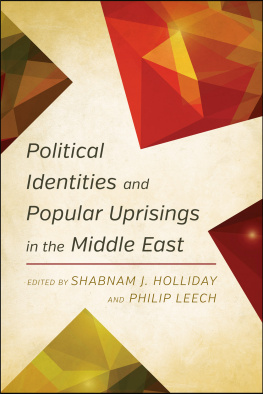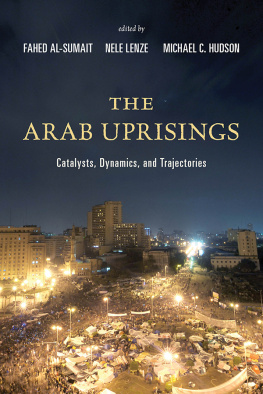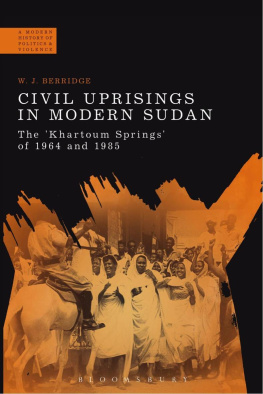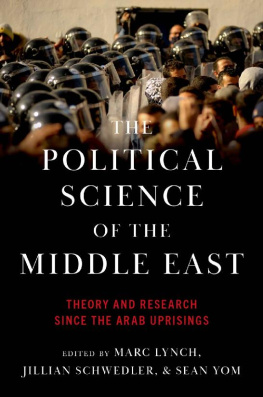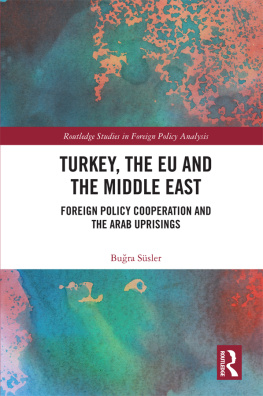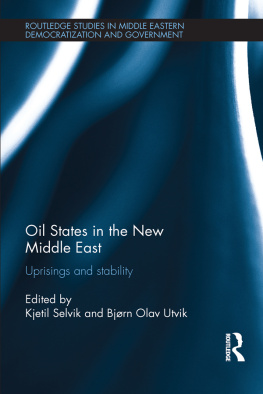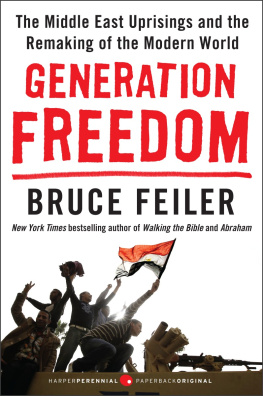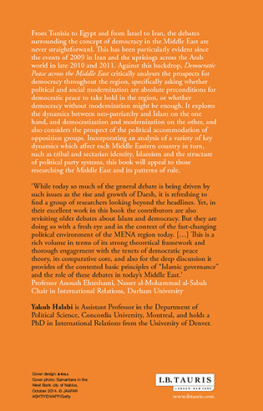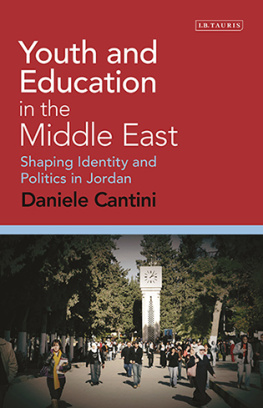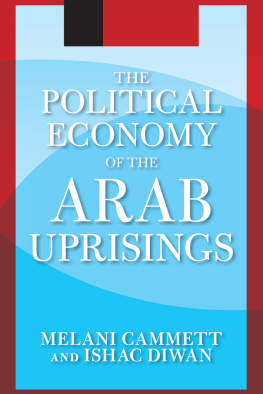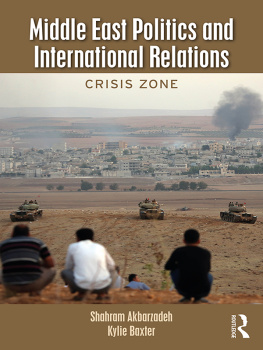Political Identities and Popular Uprisings in the Middle East
Political Identities and Popular Uprisings in the Middle East
Edited by
Shabnam J. Holliday and Philip Leech
London New York
Published by Rowman & Littlefield International Ltd
Unit A, Whitacre Mews, 26-34 Stannary Street, London SE11 4AB
www.rowmaninternational.com
Rowman & Littlefield International Ltd. is an affiliate of Rowman & Littlefield
4501 Forbes Boulevard, Suite 200, Lanham, Maryland 20706, USA
With additional offices in Boulder, New York, Toronto (Canada), and Plymouth (UK)
www.rowman.com
Selection and editorial matter 2016 by Shabnam J. Holliday and Philip Leech
Copyright in individual chapters is held by the respective chapter authors.
All rights reserved . No part of this book may be reproduced in any form or by any electronic or mechanical means, including information storage and retrieval systems, without written permission from the publisher, except by a reviewer who may quote passages in a review.
British Library Cataloguing in Publication Data
A catalogue record for this book is available from the British Library
ISBN: HB 978-1-78348-448-5
PB 978-1-78348-449-2
Library of Congress Cataloging-in-Publication Data
Names: Holliday, Shabnam J. | Leech, Philip.
Title: Political identities and popular uprisings in the Middle East / [edited by] Shabnam J. Holliday and Philip Leech.
Description: London : Rowman & Littlefield International, Ltd., 2016. | Includes bibliographical references.
Identifiers: LCCN 2015042495 (print) | LCCN 2016007251 (ebook) | ISBN 9781783484485 (cloth : alkaline paper) | ISBN 9781783484492 (paperback : alkaline paper) | ISBN 9781783484508 (Electronic)
Subjects: LCSH: Middle EastPolitics and government21st century. | Group identityPolitical aspectsMiddle East. | Protest movementsMiddle East. | DemonstrationsMiddle East. | Political activistsMiddle East. | RevolutionsMiddle East. | Political cultureMiddle East.
Classification: LCC DS63.123 .P66 2016 (print) | LCC DS63.123 (ebook) | DDC 322.40956dc23
LC record available at http://lccn.loc.gov/2015042495

The paper used in this publication meets the minimum requirements of American National Standard for Information SciencesPermanence of Paper for Printed Library Materials, ANSI/NISO Z39.48-1992.
Printed in the United States of America
To
Aara, Anoushiravan
and
Khai-Tr
Contents
Shabnam J. Holliday and Philip Leech
Shabnam J. Holliday and Paola Rivetti
Nicole F. Watts
Philip Leech
Giulia Daniele
Lorenzo Trombetta
Fernando Carvajal
Brecht De Smet
Rory McCarthy
Shabnam J. Holliday and Philip Leech
We thank the contributors to this volume for their patience and for providing the scholarship, insight, wisdom and time we needed to make this a book that we are very proud of. We also thank Anna Reeve for the encouragement to pursue the project, and all those people at Rowman and Littlefield International who have worked hard to help us make this possible.
Shabnam would like to thank Professor Nadje al-Ali who encouraged her to pursue a project on political identity and uprisings across the Middle East. She would also like to thank masters students at Plymouth University whose questions on democracy and political identity in the context of the Middle East have forced her to think through these concepts. Shabnam also thanks her colleagues in the IR/Politics group at Plymouth university for their patience while she was finalising the book. Finally, Shabnam would like to thank her family: her husband Brieg Powel for being such an amazing source of academic and emotional support and encouragement and for taking over the bedtime routine and school run; and her parents, Adrian Holliday and Mehri Honarbin-Holliday, for their academic insight and Mehri especially who has come to Shabnams rescue on so many occasions to look after Aara and Anoushiravan so as to give her extra time to work on this book.
Philip is very, very grateful for the help and encouragement he has received from so many people around him. He is especially grateful to Mai, for her kindness, work and love; Khai-Tr for all the love and joy he brings; Oliver and Lyn Leech and Jean Martin for their unwavering belief and encouragement; and to Mr. and Mrs. Ngo who have supported him and his little family in countless ways, more times than Philip can count. Philip would also like to thank Professor Caroline Andrew for kindly facilitating his fellowship at the University of Ottawa and Shabnam for offering the chance to coedit this exciting project.
For both Arabic and Persian, the transliteration chart without diacritical marks of the International Journal of Middle East Studies is used. The definite article in Arabic ( al- ) is never assimilated, except for proper nouns where assimilation is often used in the English language (e.g. Ennahdha). For Hebrew, The Library of Congress Hebrew transliteration chart is used, as recommended by the International Journal of Middle East Studies . For Kurdish, the Library of Congress Kurdish transliteration chart is also used. For proper names, those used by the individuals are used; and for proper nouns, those commonly seen in the English language are used, such as Zine el-Abidine Ben Ali, sharia, Hosni Mubarak, Hambastegi , al-Asad, Gamal Abdul Nasser and Sulaimani.
Shabnam J. Holliday and Philip Leech
In June 2009, streets across Irans cities were filled with protesters demanding to know, Where is my vote? These protests developed into what, in 2009, became known as the Green Movement and constituted the most serious challenge to the regime in the three decades of the Islamic Republic. Eighteen months later, in December 2010, the self-immolation of a street vendor named Mohammad Bouazizi sparked demonstrations across Tunisia. The next month, January 2011, it was the streets of Egyptian cities that were swollen with people calling for the end of Hosni Mubaraks dictatorial rule. That same month, Jordanians, Algerians, Kuwaitis, Palestinians and Lebanese were also protesting against their governments. While in Yemen, a popular movement demanding the removal of Ali Abdullah Saleh, the longest serving head of state in the Arab world, began. In February, Libyans, Bahrainis, Moroccans and Omanis articulated their dissent against long-standing regimes and, in Iraqi Kurdistan an autonomous, ostensibly democratic region in the north that had weathered the 2003 war and its aftermath relatively well citizens campaigned against the regional government.
As the year progressed, no country looked to be immune and not even the harshest regimes appeared safe. In March, the Saudi government deployed troops in Riyadh, the capital, but faced demonstrations in its restive Eastern Province. By mid-March, protests had broken out in Syria. These were met by immediate, brutal repression by the regimes police and security forces, but demonstrations continued to escalate through to the end of the month. Even in Israel, the archetype of a regional exception, popular demonstrations broke out on the streets of Tel Aviv over the summer.
In many of these countries, protests and popular dissent would continue or escalate. Some uprisings would ebb and flow in size and ferocity; for example, in the West Bank and Israel where, after a lull, demonstrators returned to the streets (in 2012 and 2013, respectively). In other contexts, the demonstrations would apparently shift their foci to different, or additional, grievances and targets as the political environment changed. In many cases, particularly in Syria, Yemen, Libya and Egypt, the outcomes would be tremendous turmoil, uncertainty and loss. Meanwhile, in May 2013, popular unrest erupted in Turkey, initially in opposition to a proposed building project in the historic Gezi Park but growing quickly to encompass a broad range of dissent against the government. Israelis took to the streets again in 2014 this time many were demonstrating against the governments Zionism.

 The paper used in this publication meets the minimum requirements of American National Standard for Information SciencesPermanence of Paper for Printed Library Materials, ANSI/NISO Z39.48-1992.
The paper used in this publication meets the minimum requirements of American National Standard for Information SciencesPermanence of Paper for Printed Library Materials, ANSI/NISO Z39.48-1992.
